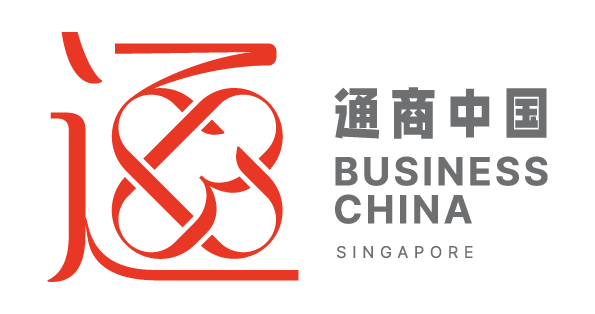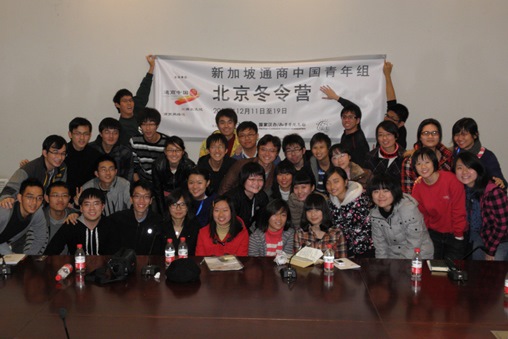Members of Business China Youth Chapter had an up-close and personal encounter with China in the cold winter in December 2010. 20 of them took part in the first overseas immersion trip put together by Business China Youth Chapter. The 9-day trip was aimed at three aspects: to deepen one’s knowledge on China’s modern development vis-à-vis its rich history, to learn to engage China’s booming economy and to build contacts with like-minded local students for future collaboration. As such, there were five facets to the activities in this Beijing Winter Trip: Interaction with local students, getting insights about China from the experts, learning from and interacting with Singaporeans based in China, visits to Singapore companies and exploring past and modern China.
Interaction with local students
An important part of immersion is getting to know the locals and building relationships with them. That is why the Youth Chapter planned two forums to network and to discuss issues with the local students from University of International Business and Economics (UIBE) and from Peking University (PKU). At UIBE, they discussed about cultural differences between the East and the West, while at PKU, they exchanged views about the pre-requisites for Chinese youths to overcome future challenges of China.
During both sessions, the participants broke into small groups of 4 – 5 people to have a more intimate interaction with the local students while they discuss on the topics.
The two fruitful sessions helped participants from Singapore and China to understand each other better. At the end of the sessions, they exchanged contacts – the mark of new friendships, which could result in potential joint business ventures.
Insights about China from the experts
Besides forging new friendships, the Youth Chapter members were also hungry for more in-depth knowledge about China. To get insights about China, they sought views of local professors, Prof Bruce Quan and Dr Pu Jun, via two separate lectures.
An American born Chinese, Associate Professor of Law at the Peking University Law School, Prof Bruce Quan came to China in 1985. He spoke to the Youth Chapter members about “Opportunities and Challenges in a Rising China”. He covered three issues important to China, which is first, her Political Stability and Domestic Tranquility, secondly, her Currency and lastly, her Indigenous Innovations. Conducted in English, Prof Quan encouraged the members to raise their views, hence resulting in an open atmosphere for discussions.
Besides his sharing his expertise on China’s law, he also conducted a simple exercise to help the members understand themselves. He said, “I know each of you wants to do something meaningful. To be able to do that, you need to understand who you are and how to get there.” In the exercise, everyone was to draw six circles and indicate their individual skill sets and passion in each of these circles. Each of these skills or passion represents mentors that one should look upon for guidance towards their career or life goals.
Gladys Wong, a student from National University of Singapore, likened the experience to a father sharing wisdom to his children.
While at another guest lecture, Dr Pu Jun, Professor of International Business at UIBE, spoke about “The Developing China Economy”. He introduced the financial environment in China and covered three aspects: macro finance, asset pricing and corporate finance. Through participative methods, Dr Pu illustrated the concepts of investing and trading. In this area, he highlighted that, while historical data is useful, it is more important to also pay attention to market environment.
Dr Pu also gave a detailed analysis of the background and strengths of various banks in China. After the session, Yeow Kai Ling, a student from Singapore Management University, said that the information helped her to understand the business environment in China. It was something she would not have been able to learn in Singapore.
Learn from and interact with Singaporeans based in China
Part of the agenda of this winter trip is to help the Youth Chapter better understand Singaporeans’ competitive edge in China and the challenges and opportunities standing ahead. What better way but to learn from fellow Singaporeans who have been living in China. As such, the Youth Chapter members arranged to meet Singaporeans based in Beijing via three avenues, a sharing session, a visit to the Singapore Embassy in China, and a SingCham networking session. Over a sharing session, they met two Singaporeans who have worked and lived in China more than a decade, Mr Andrew Loo, Marketing Director of Beijing Huadu Group and Dr Abhilash Sarma, Senior Project Manager of DynEd China. Both of them shared their wealth of experience generously with the inquisitive members.
The Youth Chapter was also welcomed when they visited the Singapore Embassy in China. An introduction was given on the role of the embassy, such as protecting the interests of overseas Singaporeans, and facilitating the relationship-building between Singapore and China. Present at the session were also other Singaporean students who have been studying in China. The session ended off with up-close discussions between Youth Chapter members and Embassy representatives and the other Singaporean students.
At another function, Singapore Chamber of Commerce and Industry in China (SingCham) hosted the Youth Chapter at the grand Renaissance Beijing Capital Hotel for an evening of food, drinks and networking with its members. SingCham also invited Mr Ignatius Lim, China Director of IE Singapore and two other HR experts to share about China’s market. Their sharing provided an overview of the opportunities for investment and employment in China.
Visit to Singapore companies
The winter trip included visits to Singapore investments Temasek Holdings and Sino-Singapore Tianjin Eco-City. This was to help the youth have a general grasp of these companies’ role in the fast-growing China.
At the Beijing office of Temasek Holdings, the representatives of the company discussed with the Youth Chapter about Temasek’s operations and background information. They also discussed about the competitive edge that Singaporean students would have towards carving a career in the general China market.
A highlight of this overseas immersion is the tour of Sino-Singapore Tianjin Eco-City (SSTEC). This bilateral project between Singapore and China has been the talk of town since its groundbreaking ceremony in September 2008. Built upon the three concepts of Practical, Replicable and Sustainable, Tianjin Eco-City aims to be an ecologically friendly city which is a home for residents, a hub for employment and a haven for investments.
As it was a rare opportunity to visit this iconic collaboration between the two countries, the Youth Chapter members responded enthusiastically with questions to learn more about the strengths and unique position of Tianjin Eco-City.
When interviewed, Mr Kenneth Lim, Eco-Technologies Deputy General Manager, who has been on the project for 2 ½ years, shared his thoughts on being a Singaporean involved in this project. He said that he took up the job because it was a challenge, and it was a chance not to be missed. Now, seeing the development of the start-up area and some of the projects have already been completed, he feels a sense of satisfaction to see what was being discussed come to fruition.
Exploring the past and modern China
Lastly, to know a country, one has to know its history and its modern culture. To understand its past, the Youth Chapter visited China’s not-to-be-missed historical sites, the Great Wall, Forbidden City and Tiananmen Square. For a feel of its modern culture, they went to the Beijing Olympic Park and 798 Art District.
The Youth Chapter members experienced the Great Wall of China at Mutianyu in its awe-inspiring fullness, minus the tourist racket.
Upon reaching the Great Wall after a 30-minute long climb, Neow Ting Feng said, “Climbing the Great Wall in this cold weather is a special experience; it makes me imagine what the ancient Hans were going through when building the Wall. It must have been a challenge to the physical body.”
The members also had an enjoyable tour of the world’s largest surviving palace complex, the Forbidden City and the iconic Tiananmen Square. As they walked through the sites, they were treated to interesting anecdotes from China’s ancient history.
Apart from exploring the past, the Youth Chapter also visited the National Aquatics Centre and the Olympic Stadium, colloquially referred to as the “Water Cube” and “Bird’s Nest” respectively. The park was surrounded by the Olympics spirit, inspiring the Youth Chapter members, who sprung into an informal race against each other.
After visiting the Olympics Park, they proceeded to the 798 Arts District to savour China’s contemporary arts and culture. 798 District is full of sculptures, art galleries, graffiti and interesting architecture. It is a space for a thriving artistic community.
The 9-day Beijing Winter Trip was indeed a valuable experience for the Youth Chapter. More than just taking back with them the many memorable moments on photographs, they also went home with prized intangibles, like the knowledge they gained from the visits and talks, and the relationships they have begun with the locals and the Singaporeans there. Reflecting on the trip, many members would agree that it has reinforced their interest to work in China in future. Diong Fu Han, a Masters graduate in Architecture from National University of Singapore, said, “This trip has reaffirmed my position to focus on the China market for my profession, and I would work towards my professional licence in China.”
Another important aspect from this trip is the interaction opportunities that came with it. The members learnt how to build positive relationships with the Chinese and the attitude and skills needed to survive in China.
Set to be a Chinese teacher in Singapore, Hon Shu Zhen, a recent graduate from Fudan University felt that the interaction opportunities taught her that Singaporeans have to learn to be highly adaptable when they work or study in China, as there is no definite set of rules in China.
The trip was made possible with the support of Hanban & UIBE. Business China hopes this will be an annual event to benefit more youths who are enthusiastic about China.

